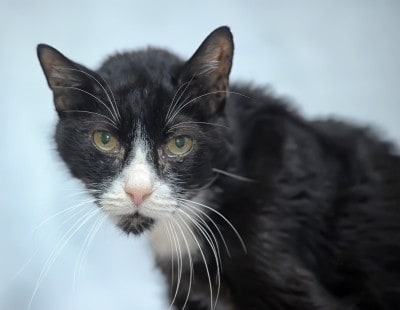Some really exciting news in the field of cancer research and treatment just came out, and if you’ve ever had a cat with oral cancer, this hits close to home.

A Breakthrough We’ve Long Dreamed About
Scientists from UC Davis and UCSF have just completed the first-ever clinical trial of a new cancer drug in pet cats, and the results are nothing short of hopeful. Of the 20 cats treated for oral squamous cell carcinoma (SCC), one of the meanest, most aggressive cancers in cats, 35% saw their disease controlled with minimal side effects. This treatment targets a protein called STAT3, a “faulty switch” that drives tumor growth, and it’s the very first drug to shut it off effectively.
Think about that. In one-third of the cases, this cancer, often thought untouchable, was held at bay (or even shrunk in some cases!) by this new therapy. And the best part is that the side effects were minimal, mostly just mild anemia.
One standout cat, Jak, was given just 6 to 8 weeks to live after diagnosis, but after treatment he lived another 8 months. Long enough to enjoy a precious additional Christmas with his family.

Jakiro or “Jak” was part of the clinical trial. He went on to live an additional eight months. (Tina Thomas)
Why This Feels Like a Ray of Sunshine
Hearing thacat parents are getting an extra Christmas with their kitty brings tears to my eyes. Because two years ago, I had to say goodbye to my Baldar, an amazing, hilarious, precious 12-year-old sphynx. He seemed totally fine until a routine dental revealed oral squamous cell carcinoma. He was asymptomatic that day. But from discovery to heartbreak, it was just two short months. There was absolutely nothing we could do except keep him comfortable and loved until it was time to let him go. He was my heart cat. Losing him felt impossible.
That’s why this new trial means so much to me. It means that for cats like Baldar, and for other families facing that gut-punch diagnosis, there might one day be more than just comfort.
The Grim Reality We Face… But with a Growing Light
Here’s how tough SCC is in cats:
| Type / Context | Survival / Statistics |
|---|---|
| Oral SCC (overall) | Most cats survive only 2–3 months; 1-year survival is <10% |
| Median survival (untreated) | Around 2–4 months, with treatment barely nudging beyond that |
| Treatment (surgery, radiation) | Surgery alone median survival < 3 months; 1-year survival <10%. Best case (radical mandibulectomy ± radiation): 11–23 months, but risky |
| Radiation alone (palliative) | 3–5.5 months, with better outcomes if tumor is small/early |
So yeah, without early detection and aggressive and often invasive treatments, the odds are heartbreaking. But this new STAT3 decoy changed the game for several cats.
Why This Trial Is More Than Just Science
- It’s tackling a nearly “undruggable” protein, STAT3, which is implicated in many cancers—so if this works, it could impact human cancer treatments too
- It demonstrates that pets can lead the way in testing with cancers that mirror human disease more closely than lab rats: spontaneous, heterogeneous, and environmental
- It means real extra time for families…and that time matters so, so much.
What Comes Next?
Scientists are already partnering with biotech firms to advance human clinical trials, and the vision is to eventually combine this drug with other therapies for even better results.
A Chat Among Friends

Baldar lost his fight to oral squamous cell carcinoma two years ago.
I’m so emotional about sharing this news. I picture Baldar snuggled right next to me, and I wish so deeply that this treatment had existed then. But now, knowing there might be a future where oral SCC in cats isn’t a guaranteed death sentence…that gives me hope.
So if you’re reading this and you’ve been through that same heartbreak, know you’re not alone. And there’s a growing light in the tunnel.




